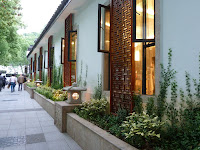During the Southern Song dynasty, there lived two Song brothers who were intellects. However, they did not want to work for the government choosing to live the simple life of fishermen. An evil local officer who coverted the elder Song brother's beautiful wife, schemed to have him poisoned. When the younger brother went to the government office 衙门 yámen to lodge a complaint, it was not only disregared but he was also beaten up.

He had no choice but to flee Hangzhou for his own safety. Just before he left, his sister-in-law used sugar and vinegar to cook him a parting meal with a fish saying “这菜有酸有甜,望你有出头之日,勿忘今日辛酸” This dish is both sweet and sour. I hope that should you later succeed in Life, that you do not forget the bitterness of this day."
The younger brother later became renowned for helping his country to fight against invaders and was rewarded with a high status. He returned to his hometown to punish the evil doers. However he could not find any traces of his sister-in-law. One day while attending a banquet he tasted the familiar fish dish and discovered his sister-in-law living in incognito 隐姓埋名 yǐnxìng-máimíng and they were reunited.
Henceforth, this dish was known as 西湖醋鱼 Xī Hú cùyú (West Lake Vinegar Fish). It was also sometimes called Sister-in-law's Treasures “叔嫂传珍” shūsǎo chuánzhēn and was passed down as another of Hangzhou's famous dishes.
I dug into the tender meat of the succulent fish without hesitation and liked the mild taste of vinegar rounded off by the sweetness of sugar. There is just a tinge of sourness, enough to touch the soft spot of my heart at the plight of the sister-in-law but not sharp enough to bring out any tears…
.



